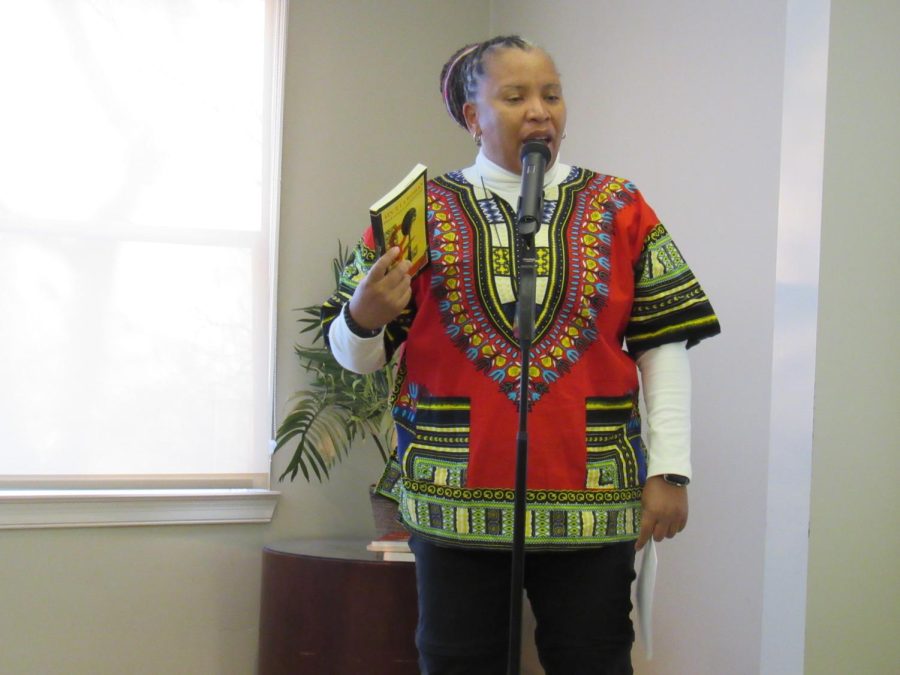Women’s Center hosts event celebrating the legacy of bell hooks
Charmaine Crawford, associate professor of Africana Studies at Kent State, speaks at the “Speaker on the Path: The Words and the Works of bell hooks” event at the Williamson House on Tuesday, Jan. 25, 2022.
January 25, 2022
Stepping up to the microphone, Cassie Pegg-Kirby welcomed a group of in-person and virtual guests to the latest of Kent State’s events in the Martin Luther King Jr. Celebration series – “Seeker on the Path”: The Words and Works of bell hooks.
“This is our offering to the community,” said Pegg-Kirby, director of the Women’s Center. Along with several of her colleagues, she was grieving the recent loss of author and activist bell hooks when they produced the idea of a celebration honoring what Pegg-Kirby calls “the ongoing legacy and how her work and words continue to impact us.”
Guests arrived in an environment curated to be inclusive, a room in the Williamson House complete with soft jazz music, individually-wrapped cookies and buckets to reach in and pull out hooks’ famed quotes.
First to share her thoughts was Heaven Brown, a senior at Bio-Med Science Academy and intern for the Women’s Center. Her first encounter with bell hooks came through the book “Ain’t I a Woman?” Brown shared her perspective that the concept of the “strong Black woman” is an “exhausting standard” to reach.
“I don’t think that survival should be equated with superpowers,” she said, explaining that Black women are at the center of race and gender violence.
Members of the Kent State community were joined by faculty from Berea College, where hooks taught from 2004 to her death in Dec. 2021. The attendees shared quotes honoring her legacy.
“For me, she’s gone too soon,” said Associate Professor of Africana Studies Charmaine Crawford, as she cracked open the yellow paperback of hooks’ “Teaching to Transgress.”
Crawford first encountered hooks when researching for a paper on Black women and work, when her professor photocopied the first chapter of “Ain’t I a Woman?” for her. Years later, she bought the stack of books she brought with her tonight.
She first said how hooks was able to examine intersectionality and the exploitation of black women’s bodies “with a boldness and a fearlessness.”
bell hooks referenced Martin Luther King Jr. in a passage Crawford shared from “Teaching to Transgress.” King believed “we had to embrace ‘true values’ to move forward into healing.”
“Justice occurs in multiple forms, right? Political, economic and social, but it also occurs on the epistemic level in relation to love and care and community,” Crawford said.
Idris Syed, associate professor of Africana studies and Kent State alum, and associate English lecturer Denise Harrison, both shared how hooks inspired them to be vulnerable in the classroom.
“We have to allow those sharp edges to show and we have to remember that the classroom is the most radical space in American society,” Syed said. “And bell hooks’ work will continue to live with us forever because of those concepts.”
hooks is well-known for her prose, as well as the poetry that the Wick Poetry Center Director David Hassler highlighted. He read from “Appalachian Elegy: Poetry and Place,” her examination of her Kentucky roots, in which she “holds grief and praise in each hand equally informed by her love.”
Student leaders Chazzlyn Jackson and Zaria Johnson shared how hooks had affected them as Black women and leaders. Johnson, senior journalism major and editor-in-chief of The Kent Stater, shared the affirming portrayal of black rage in “Killing Reach: Ending Racism.”
Jackson, senior Africana studies major and president of United Student Government, learned of hooks in Crawford’s class where she read the book “Talking Back: Thinking Feminist, Thinking Black.”
“I learned to embrace my voice and be affirmed as a black woman – something that is still an ongoing lesson for sure here in America, but it really jump-started after reading this book and Dr. Crawford’s class,” Jackson said.
This authenticity was echoed throughout the program, and especially in the quote behind the event’s name, “Seeker in the Path: The Words and Works of bell hooks.”
“If I were really asked to define myself, I wouldn’t start with race. I wouldn’t start with blackness. I wouldn’t start with gender. I wouldn’t start with feminism,” hooks said in an interview with Tricycle.
“I would start with stripping down what fundamentally informs my life, which is that I am a seeker on the path.”
After the program, senior education studies major Taiwo Mack shared her history with hooks. Mack was raised in the south, where Black women teachers were her safe space and radicalized her love for learning.
“What people touched on a lot was her vulnerability, her radical vulnerability,” Mack said, referring to how she plans to use bell hooks to inspire her future students. “Showing up authentically is something that excites me.”
Sophie Young is a reporter. Contact her at [email protected].












